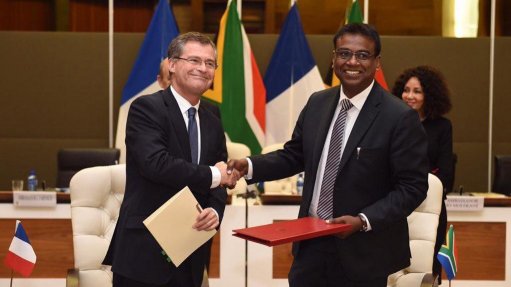
Jean-Pascal Le Franc (left) shakes hands with Dr Valanathan Munsami (right) after they signed the MoU
Photo by: Sansa
The South African National Space Agency (Sansa) and its French counterpart, the Centre National d’Études Spatiales (CNES – the National Centre for Space Studies), signed a memorandum of understanding (MoU) on Thursday in Pretoria, laying the foundations for future cooperation between the two organisations. The MoU was signed by Sansa CEO Dr Valanathan Munsami and CNES planning, international relations and quality director Jean-Pascal Le Franc.
“Sansa and CNES have enjoyed a fruitful relationship for almost 40 years and this MoU cements the partnership with the intent of making greater strides in space investment both locally and abroad,” highlighted Munsami. Areas covered by the MoU include Earth observation, space operations, space science, research and technology, and telecommunications. Furthermore, the two parties will work together on international regulatory issues. The first discussions have been focused on the training of engineers, the International Charter on Space and Major Disasters and the Space Climate Observatory.
“CNES is proud and honoured that Sansa is partnering with it in this wide-ranging cooperation, which builds on the already numerous and long-standing links between our two agencies, not least for space operations,” affirmed Le Franc. “Sansa plays a vital role in the development of space activities, not only within South Africa but across the African continent.”
“Pursuing its policy of active cooperation with the new space powers, CNES is delighted to consolidate its presence in Africa – a region of the world where the priorities of French space policy, especially tackling climate change, take on an extra dimension,” he added. French cooperation has been important for South Africa’s space activities. The French South Africa Institute of Technology (F’SATI) has played an important role in developing South Africa’s nanosatellite (popularly called CubeSat) programme.
Designed and built at the Cape Peninsula University of Technology under the aegis of F’SATI and the African Space Innovation Centre, to date two CubeSats have been successfully launched into space. The second of these, ZACube-2, launched in late December, is intended to be followed by a constellation of new nanosatellites.
The signing of the MoU was witnessed by South African International Relations and Cooperation Minister Lindiwe Sisulu and French Europe and Foreign Affairs Minister Jean-Yves Le Drian.